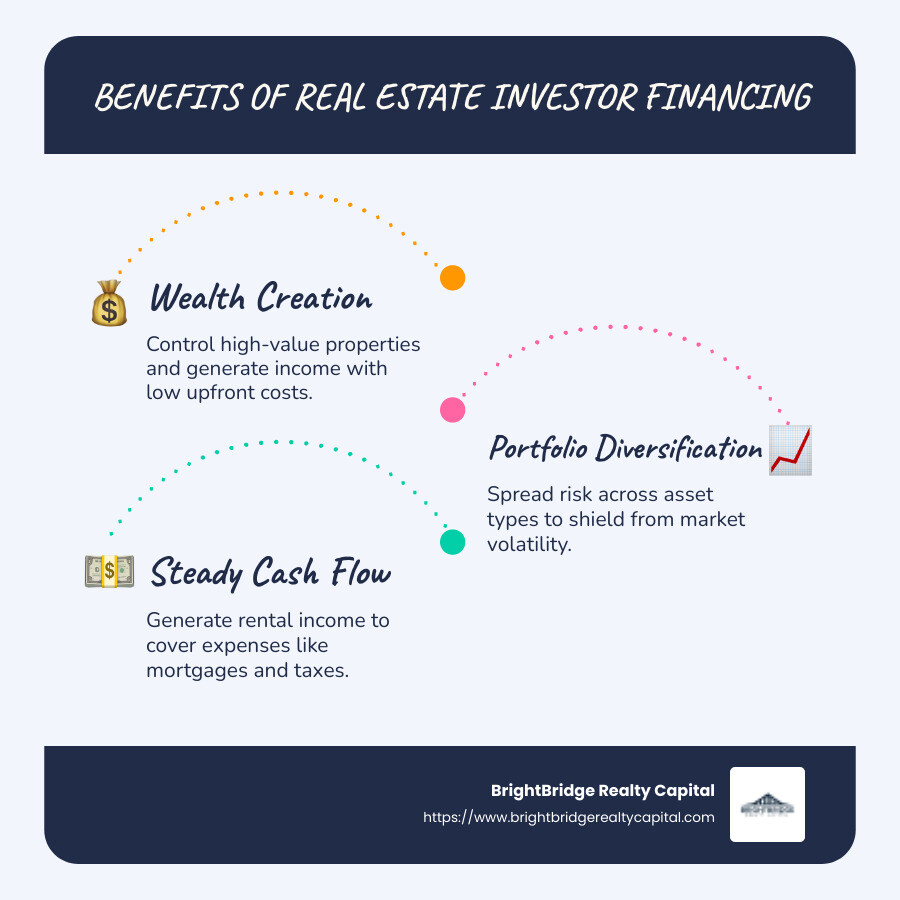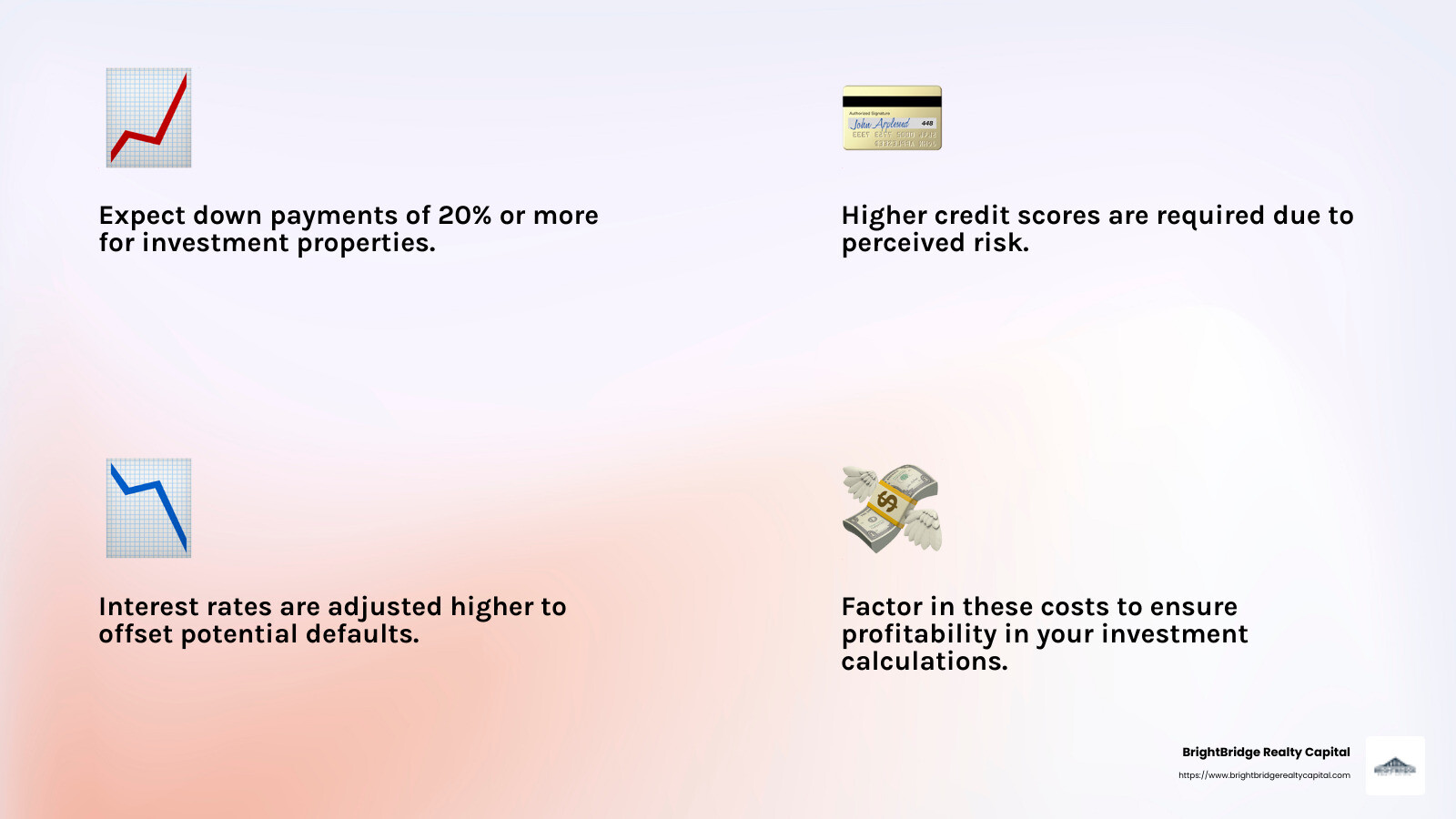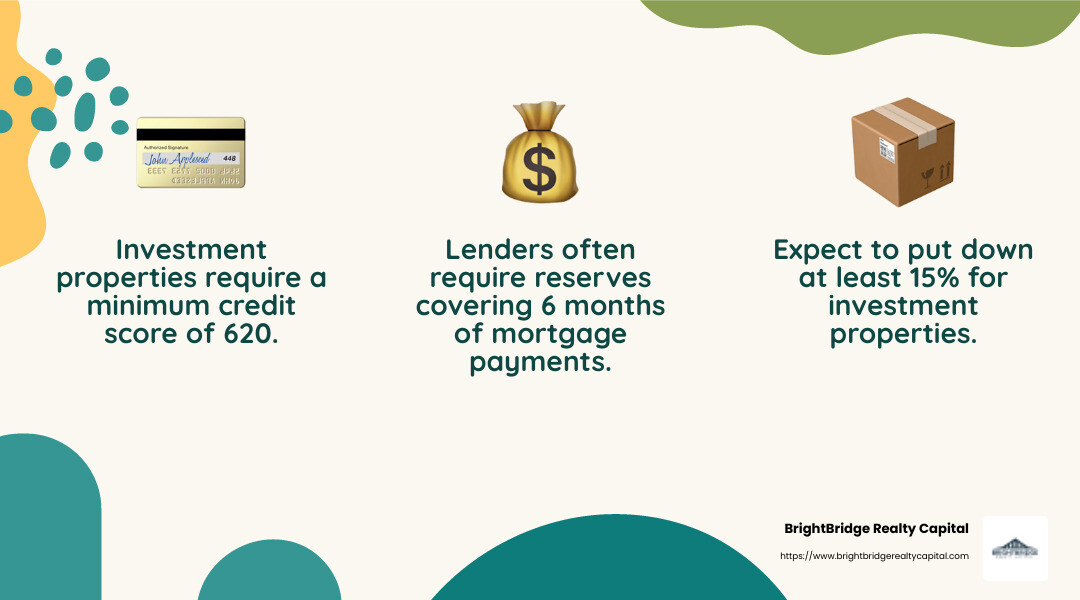Financing Your Real Estate Dreams: A How-To Guide for Investors

Real estate investor financing offers a lucrative pathway to wealth creation and portfolio diversification. Imagine controlling high-value properties and generating income with relatively low upfront costs. That's the power of real estate investment.
- Investment Properties: A cornerstone of financial growth, allowing investors to build equity over time.
- Diversification: Spreads risk across different asset types, shielding your portfolio from market volatility.
- Cash Flow: Provides a steady income stream, potentially covering expenses like mortgages and taxes.
Jumping into real estate investing allows for steady cash flow and the chance to diversify away from traditional stocks and bonds. Properties often appreciate over time, acting as a hedge against inflation. With the right financing strategy, you can own tangible assets that offer both immediate income and long-term growth potential.
Stay tuned as we explore everything you need to know to make your real estate investment dreams come true.

Glossary for Real estate investor financing:
Understanding Real Estate Investor Financing
When it comes to real estate investor financing, things can get a bit tricky. Unlike buying a primary home, lenders see investment properties as riskier. This means they have stricter rules for investors. Let’s dive into what you need to know.
Higher Down Payments
First off, expect to pay more upfront. While you might get away with a lower down payment on your primary home, investment properties usually require a bigger chunk of cash. Lenders want to see that you're serious and have skin in the game. So, be prepared for down payments that can reach 20% or more.
Stricter Credit Requirements
Your credit score matters—a lot. Because of the perceived risk, lenders demand higher credit scores from investors. A solid credit history shows you're trustworthy and likely to repay the loan. If your credit score isn't where it needs to be, consider strategies to boost it. This could be as simple as paying off outstanding debts or requesting credit line increases.
Risk-Adjusted Interest Rates
Interest rates for investment properties are typically higher than those for primary residences. Why? It's all about risk. Lenders adjust rates to protect themselves in case of default. This means your monthly payments could be higher, affecting your cash flow. It's crucial to factor these costs into your investment calculations to ensure the property remains profitable.

Understanding these key differences in financing can help you prepare better and make informed decisions. The path to successful real estate investing involves balancing costs with potential returns.
Next, we'll explore the different types of financing options available for real estate investors.
Types of Real Estate Investor Financing
When it comes to financing your real estate dreams, you have several options. Each type of real estate investor financing has its own benefits and drawbacks. Let’s break them down.
Conventional Loans
Conventional loans are the most common choice for real estate investors. These loans are provided by private lenders and follow guidelines set by entities like Fannie Mae and Freddie Mac.
- Pros: Lower interest rates compared to other options.
- Cons: Require a higher credit score and a larger down payment, typically 20% or more.
These loans are great if you have a strong credit history and can afford the upfront costs.
Hard Money Loans
Hard money loans are short-term loans offered by private investors or companies. They focus more on the value of the property than your credit score.
- Pros: Quick approval and funding, useful for flipping houses.
- Cons: High interest rates and short repayment terms (usually 6 to 18 months).
These loans are ideal if you need fast cash and plan to sell or refinance the property quickly.
Private Money Loans
Private money loans come from individuals like friends, family, or business partners.
- Pros: Flexible terms and potentially lower interest rates.
- Cons: Risk of straining personal relationships if things go south.
These are suitable if you have a network willing to invest in your real estate ventures.
Home Equity Loans and HELOCs
If you already own a home, you can tap into its equity with a home equity loan or HELOC (Home Equity Line of Credit).
- Home Equity Loan: Provides a lump sum with a fixed interest rate.
HELOC: Works like a credit card, allowing you to borrow as needed.
Pros: Lower interest rates compared to other loans.
- Cons: Risk of foreclosure if you can't repay.
These are useful if you need a large down payment or want to finance renovation costs.
Commercial Loans
Commercial loans are for properties with five or more units or for business-related real estate investments.
- Pros: Can finance larger, income-producing properties.
- Cons: More stringent qualification requirements and higher interest rates.
These loans are best if you're looking to invest in larger apartment complexes or commercial buildings.
Understanding these options can help you choose the best financing method for your investment goals. Up next, we'll dig into some creative financing strategies that can offer unique advantages.
Creative Financing Strategies
When traditional loans don't fit your needs, creative financing strategies can open new doors. Let's explore three popular methods: seller financing, crowdfunding, and syndicates.
Seller Financing
Seller financing allows the property seller to act as the lender. Instead of applying for a bank loan, you make payments directly to the seller.
- Pros: Faster transactions and flexibility for buyers who might not qualify for traditional loans.
- Cons: Potential for buyer default and fewer consumer protections.
This method can be a win-win, especially if the seller is motivated to close quickly. However, it requires careful legal documentation to protect both parties.
Crowdfunding
Crowdfunding is about pooling resources from multiple investors to fund real estate projects.
- Pros: Access to larger investments with less individual capital.
- Cons: Complex management and potential regulatory problems.
Platforms like these enable you to own a piece of a big property without the big price tag. Just be prepared for the complexities of managing multiple investors.
Syndicates
Syndicates involve forming a group of investors to buy real estate.
- Pros: Diversification and access to substantial properties.
- Cons: Requires experience and resources due to complex legal and management structures.
Syndicates must be registered entities and are regulated by the U.S. Securities and Exchange Commission. They need a sponsor to identify properties and attract passive investors.
These creative financing strategies can be powerful tools for real estate investors. They offer unique advantages, particularly when conventional loans are not an option. However, they also come with their own set of challenges and risks. Make sure to weigh these carefully and consult with experts as needed.
Next, we'll dive into the specific requirements you need to meet for real estate investor financing.
Real Estate Investor Financing Requirements
When you're gearing up to finance an investment property, there are a few key requirements you'll need to meet. Let's break these down into three main areas: credit scores, down payments, and reserve requirements.
Credit Scores
Your credit score is a big deal in real estate investing. Lenders look at this number to gauge how risky it is to lend you money. For investment properties, the bar is set higher than for primary residences.
- Minimum Credit Score: Generally, you'll need at least a 620 credit score. However, if you're aiming for a lower down payment, say 15%, you'll need a score of around 680. This is because investment properties are seen as riskier, so lenders want to see that you have a strong credit history.
Down Payments
Down payments for investment properties are notably higher than those for a primary home. This is due to the increased risk associated with these types of loans.
- Standard Requirement: Expect to put down at least 15%. But if you're purchasing a multi-unit property, the down payment requirement could be even higher.
- Why So High?: A larger down payment reduces the lender's risk and can also help you secure a more competitive interest rate.
Reserve Requirements
Reserve requirements are about having a financial cushion. Lenders want to ensure that you can cover mortgage payments even if your rental property isn’t generating income.
- Typical Reserve: Lenders often require you to have enough reserves to cover at least six months of mortgage payments. This includes principal, interest, taxes, and insurance.
- Purpose: This reserve acts as a safety net, ensuring that you can handle unexpected vacancies or financial setbacks without defaulting.

Meeting these requirements can seem daunting, but they’re in place to protect both you and the lender. By ensuring you have a solid financial footing, you’re more likely to succeed as a real estate investor.
Next, let's tackle some frequently asked questions about real estate investor financing.
Frequently Asked Questions about Real Estate Investor Financing
Is it difficult to get an investment property loan?
Getting an investment property loan can be challenging, but not impossible. Loan requirements are stricter than those for primary residences. You'll need a solid credit score—typically a minimum of 620, though for a lower down payment, a higher score of around 680 might be necessary.
Down payments are also heftier. Expect to put down at least 15% of the property's purchase price. This is because lenders see investment properties as riskier ventures compared to primary homes.
What is the 2% rule for investment property?
The 2% rule is a guideline used by real estate investors to evaluate the potential ROI of a rental property. According to this rule, a rental property should generate monthly rental income equal to at least 2% of the purchase price.
For example, if you buy a property for $200,000, you should aim to charge at least $4,000 in rent each month. While the 2% rule is a helpful benchmark, it's not set in stone. Some investors might use the 1% rule depending on market conditions and other factors.
Can I put down less than 20% on an investment property?
Yes, it is possible to put down less than 20%, but it depends on the loan type. Some lenders allow for as little as 15% down on a single-unit investment property.
If you're planning to live in one of the units, you might qualify for even lower down payment options through specific loan programs like FHA loans, which could require as little as 3.5% down. However, lower down payments generally come with higher interest rates and stricter credit score requirements.
Understanding these options can help you find the best financing strategy for your investment goals.
In the next section, we'll explore creative financing strategies that can further help you achieve your real estate dreams.
Conclusion
At BrightBridge Realty Capital, we understand that real estate investor financing can be complex. That's why we offer customized solutions designed to meet your unique needs. Whether you're flipping houses, building from the ground up, or expanding your rental portfolio, our goal is to provide you with the financial tools necessary to succeed.
One of our key advantages is our ability to offer fast closings, often within a week. This speed and efficiency mean you can seize investment opportunities as they arise without delay. Our direct lending approach eliminates intermediaries, allowing us to offer competitive rates and a seamless, hassle-free process.
We pride ourselves on being a one-stop shop for all your real estate financing needs. From the initial application to the final payoff, our team of experts is dedicated to guiding you every step of the way.
If you're ready to take the next step in your real estate investment journey, explore our loan options today. We’re here to help you turn your real estate dreams into reality.


